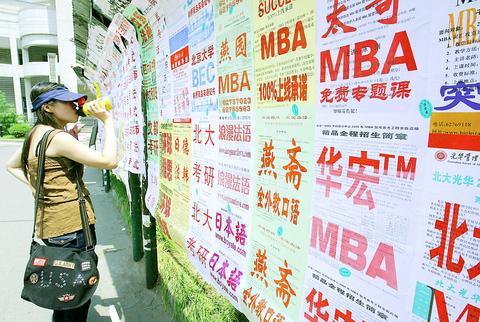Fifteen years after troops backed by tanks crushed China's democracy movement centered on Beijing's Tiananmen Square, some survivors and families of the dead are still seeking redress.
For Ding Zilin (

PHOTO: AFP
"Today, as we face those names so familiar to us, our hearts continue to tremble and bleed," she wrote on behalf of the Tiananmen Mothers advocacy group in a letter sent to reporters in Beijing. "We should remember that the system we live in is full of barbarism, inhumanity and hypocrisy.
"It remains a system in which freedom and democracy are smothered, in which any sparks of civilization must be extinguished, and in which any who challenge this system must be ruthlessly suppressed," she wrote.
The mothers demanded that China's current leadership, led by President Hu Jintao (胡錦濤) and Premier Wen Jiabao (溫家寶), who are keen to burnish their "men of the people" image, recognize the military suppression as a crime against humanity.
"[They need] the kind of courage that can face the crimes of history with true repentance," wrote Ding, who rights groups say is under house arrest to prevent her from meeting journalists or publicly commemorating the June 4 anniversary.
Hu replaced Jiang Zemin (
The Tiananmen Mothers recorded the names of 182 people killed during the massacre, including Cheng Renxing (程仁興), who fell at the base of a flagpole flying the Chinese flag at the center of the square, and Wu Guofeng (吳國鋒), who appeared to die from bayonet wounds.
In March, Wen ruled out an appraisal of the 1989 protests, citing the need for unity and stability.
But authorities have changed their description of the protest from a "counter-revolutionary rebellion" to a "political disturbance," ostensibly playing down its significance in the hope that people would forget about it.
Witnesses and rights groups say hundreds, if not thousands, of people died during the crackdown. Some died on the streets giving first aid to the injured. Most victims are unaccounted for because their families fear repercussions if they come forward.
Many were killed at intersections such as the Muxidi Bridge in western Beijing, where ordinary citizens gathered to block tanks from rolling into the city center, they said.
For Bao Tong (
"It even should have been possible to seize the opportunity to expand political reform, which aimed at greater democracy," Bao wrote in a commentary, a copy of which was made available to foreign media.
Instead, human rights violations and curbs on press freedom had only worsened, he said.
"The party seems to have put itself back in charge of judging and making arrests in political cases, and in charge of media and publishing, all to support its policy of `stability above all,'" wrote Bao, who has been under tight surveillance since his release from prison in 1996.
Analysts said a reassessment of the protests was next to impossible in the near future because leaders who were either involved in or benefited from the crackdown are still alive.
Journalist Dai Qing (
"Back in those days, Wang Dan (王丹) would never choose to do small things. But I don't think that just because it's small, it's not worth doing," she said.

A fire caused by a burst gas pipe yesterday spread to several homes and sent a fireball soaring into the sky outside Malaysia’s largest city, injuring more than 100 people. The towering inferno near a gas station in Putra Heights outside Kuala Lumpur was visible for kilometers and lasted for several hours. It happened during a public holiday as Muslims, who are the majority in Malaysia, celebrate the second day of Eid al-Fitr. National oil company Petronas said the fire started at one of its gas pipelines at 8:10am and the affected pipeline was later isolated. Disaster management officials said shutting the

US Vice President J.D. Vance on Friday accused Denmark of not having done enough to protect Greenland, when he visited the strategically placed and resource-rich Danish territory coveted by US President Donald Trump. Vance made his comment during a trip to the Pituffik Space Base in northwestern Greenland, a visit viewed by Copenhagen and Nuuk as a provocation. “Our message to Denmark is very simple: You have not done a good job by the people of Greenland,” Vance told a news conference. “You have under-invested in the people of Greenland, and you have under-invested in the security architecture of this

Japan unveiled a plan on Thursday to evacuate around 120,000 residents and tourists from its southern islets near Taiwan within six days in the event of an “emergency”. The plan was put together as “the security situation surrounding our nation grows severe” and with an “emergency” in mind, the government’s crisis management office said. Exactly what that emergency might be was left unspecified in the plan but it envisages the evacuation of around 120,000 people in five Japanese islets close to Taiwan. China claims Taiwan as part of its territory and has stepped up military pressure in recent years, including

UNREST: The authorities in Turkey arrested 13 Turkish journalists in five days, deported a BBC correspondent and on Thursday arrested a reporter from Sweden Waving flags and chanting slogans, many hundreds of thousands of anti-government demonstrators on Saturday rallied in Istanbul, Turkey, in defence of democracy after the arrest of Istanbul Mayor Ekrem Imamoglu which sparked Turkey’s worst street unrest in more than a decade. Under a cloudless blue sky, vast crowds gathered in Maltepe on the Asian side of Turkey’s biggest city on the eve of the Eid al-Fitr celebration which started yesterday, marking the end of Ramadan. Ozgur Ozel, chairman of the main opposition Republican People’s Party (CHP), which organized the rally, said there were 2.2 million people in the crowd, but